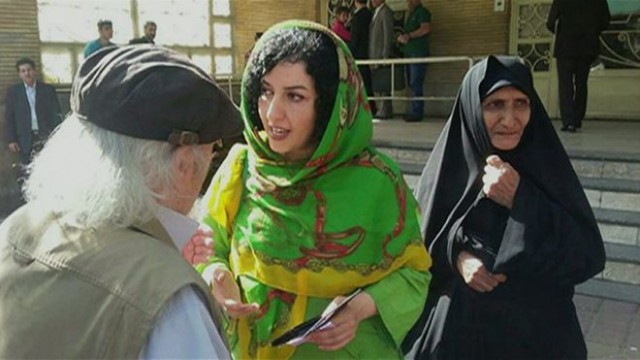Husband of Jailed Activist Narges Mohammadi Asks Rouhani’s Minister to Review Her Case
250 Activists and Journalists Sign Statement Calling for Her Release
Iranian Judiciary authorities have advised the family of detained human rights activist Narges Mohammadi that her May 5, 2015 arrest and transfer to Evin Prison was in fact enforcement of her six-year prison sentence dating back from a 2011 judicial case, which she had been unable to serve as a result of illness, her husband Taghi Rahmani told the International Campaign for Human Rights in Iran.
Mohammadi had been released on bail of 600 million toman (US $200,000) since 2012 for medical reasons, following her imprisonment earlier that year due to charges stemming from her peaceful activism and her membership in the now-banned Defenders of Human Rights Center.
Her current detainment can only be explained as a punitive response on the part of the authorities to her continued peaceful activism in Iran. Moreover, contrary to normal procedure, the renowned civil activist was not summoned to turn herself in for enforcement of her sentence. Instead, she was arrested during a raid on her home.
In addition, Mohammadi had appeared before the judge presiding on a new judicial case against her two days before her arrest, and the presiding Judge Abolfazl Salavati had agreed to extend her trial date to give her lawyers a chance to review her case.
Two hundred and fifty human rights and women’s rights activists and journalists signed a statement on May 6, demanding the release of Narges Mohammadi.
In October 2011, Branch 26 of Tehran Revolutionary Court sentenced Mohammadi to 11 years in prison on charges of “assembly and collusion against national security,” “membership in the Defenders of Human Rights Center,” and “propaganda against the state.” Branch 54 of the Tehran Appeals Court later reduced her sentence to six years in prison. Mohammadi’s lawyer was informed of her sentence two months after it had been issued.
The now-banned Defenders of Human Rights Center was founded by Nobel Peace Prize laureate Shirin Ebadi, Abdolfattah Soltani, Mohammad Ali Dadkhah, Mohammad Seifzadeh, and Mohammad Sharif. Security forces closed the Center in 2008 and have since prosecuted many of its members on vague national security charges.
Taghi Rahmani, a political activist who was repeatedly prosecuted until he fled Iran to live in exile in Europe, told the Campaign, “Narges was released on bail in May 2012, three years ago, because it was deemed that she could not tolerate her prison sentence due her illness. For her to be returned to prison to serve her previous sentence is unfair and means nothing but cruelty to her.”
“Her condition is very worrisome,” Rahmani added. “According to the doctors, Narges’ illness is intensified in closed spaces such as a cell or in prison. The Evin Prison infirmary lacks the necessary facilities [to care for her]. Prior to her 2007 arrest, she did not have any illnesses. She suffered epilepsy and muscular paralysis in prison, to the point where she was transferred from prison to hospital in 2012, and was released on bail later.”
Rahmani also asked Iran’s Minister of Intelligence to help launch an investigation into the cases of other individuals prosecuted in the aftermath of the 2009 disputed presidential election.
“When Mr. Alavi, Hassan Rouhani’s Intelligence Minister, had just been appointed to his position, he promised to look into the cases of those imprisoned in 2009, but not only was this review never carried out, Narges was returned to prison for her case from those years,” Rahmani told the Campaign.
“I would like to ask Mr. Alavi to review Narges’ case, as well as the cases of other Center for Human Rights Defenders members, as he promised. Mr. Soltani, Mr. Seifzadeh, and Narges are now in prison, and Mr. Dadkhah also has a suspended case while is outside prison. These are just a few of the individuals arrested since 2009,” he concluded.







